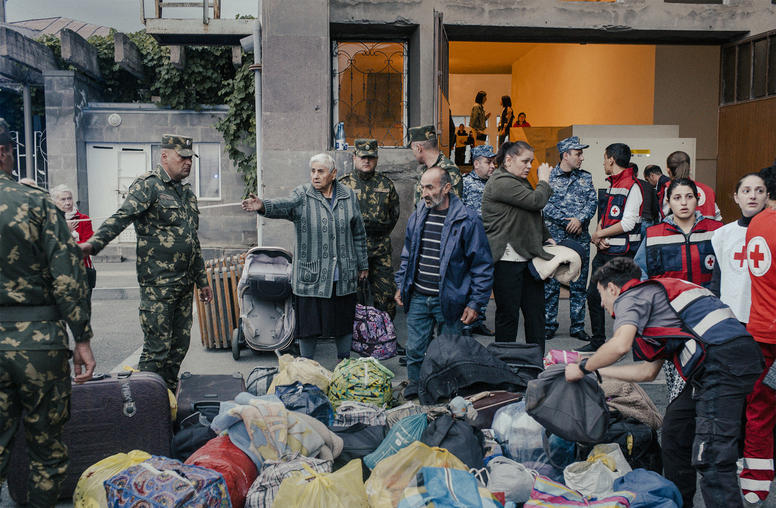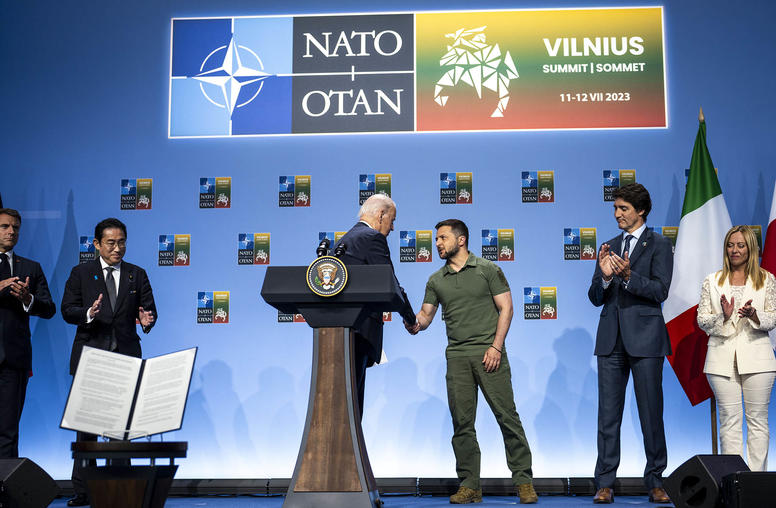To Sustain Hopes for Peace in Ukraine, Keep an Eye on Turkey
Even as brutality seems to block options now for talks, it’s vital to keep channels open.
Russia’s atrocities against Ukrainian civilians and its escalated warfare in southeastern Ukraine have swept aside last month’s public discussion of peace options as the countries briefly held talks in Turkey. Yet even in the darkest moments, all sides in this war, including the United States and Europe, have strong interests in maintaining channels for negotiation that can be used when opportunity re-emerges. Protecting that interest means understanding and maintaining Turkey’s role in facilitating talks—and its potential to serve more actively as a mediator.

By at least some norms of peace processes, Turkey is an atypical mediator—but policymakers would do well to note strengths, not widely recognized, that it can bring to this role. While analysts have suggested China, Israel, India and others as possible mediators—and while no options should be ignored—Turkey has emerged as the most immediately useful go-between. It is no accident that Turkey was Kyiv’s and Moscow’s preferred choice for their brief attempts at negotiations in March. By design, Turkey’s role in those talks was limited to facilitation, providing a secure space and even-handed treatment of Russian and Ukrainian negotiators, but without injecting Turkish observations or proposals.
Particularly for Russia, Turkey can seem like an illogical choice as mediator. It is not neutral between the combatants, but rather is a member of NATO, which Russia’s government has declared an enemy. Turkey has supported Ukraine with humanitarian gestures, evacuating some 16,000 civilians from combat zones and receiving nearly 60,000 Ukrainian refugees so far. It has even sold Turkish-built, armed, aerial drones that Ukrainians have deployed against Russian ground offensives. Also, Russia and Turkey have had their own conflicts, both historically and in recent years.
Yet part of Turkey’s utility as an interlocutor for Russia may be some of these very qualities. Any eventual Russian-Ukrainian agreement will need acceptance—and likely, reconstruction funds—from the United States and Europe. As a NATO member, Turkey can offer influence with its U.S. and European allies in securing that support. Turkey has built credibility by developing a specific capacity for mediation over recent decades, and by showing itself to Russia and Ukraine as an independent actor that, while a NATO member, is not unduly influenced by the United States or Europe. Even now, with heightened battlefield violence and accusatory rhetoric from both sides, Turkey is continuing its go-between role. Its diplomats are continuing meetings with both sides separately and keeping lines of communication open. This creates an asset for managing, and hopefully limiting, the conflict—one that policymakers should not ignore.
Why Turkey Seeks the Middle
Turkey is eager to play a mediating role in hopes of shortening a war that threatens its vital strategic and economic interests. If Russia succeeds in its offensive to seize the southern Ukraine coastline, it will come close to restoring the dominance over the Black Sea region that the Soviet Union wielded during the Cold War. Such a resurgence in the power of Turkey’s main historical competitor in the Black Sea is a deeply discomfiting prospect for Turkey’s government.
President Recep Tayyip Erdogan’s government also is eager to prevent this war from vastly multiplying Turkey’s existing economic crisis, already the worst in 20 years, in anticipation of presidential and parliamentary elections in 2023. Erdogan’s Justice and Development Party consolidated its rule beginning in 2002 by leading Turkey out of its previous recession, but the COVID pandemic and a stall in essential reforms have let inflation and debt surge, and Turks’ living standards decline.
A major economic burden for three decades has been Turkey’s costs from nearby wars—in Georgia, Nagorno-Karabakh, Iraq and Syria. These costs include disrupted trade and the flight to Turkey of an estimated 4 million refugees. The new war to Turkey’s north will slash the foreign tourism, more than a quarter of it from Russia and Ukraine, that brings vital revenues. It could put at risk critical energy supplies, for Turkey imports nearly half of its natural gas from Russia (and now depends on gas more heavily with droughts that have cut hydropower production). Also, Russia is building Turkey’s first nuclear power plant at Akkuyu, on Turkey’s southern coast.
Turkey’s Credibility as an Interlocutor
Turkey has consciously built a role for itself as a mediator in conflicts over the past two decades and has been careful to sustain dialogue with Russia despite the two countries’ often combative relations. Turkey’s former ambassador to NATO, Tacan Ildem, describes a "competitive cooperation" in which Turkey and Russia work, issue by issue, on a transactional basis. This relationship has let the countries manage their competing roles in conflicts from the South Caucasus region to Libya and Syria. They modulated crises that arose in 2016, after Turkish forces shot down a Russian jet over Syria and the Russian ambassador in Ankara was assassinated.
The countries’ relations improved significantly in the past six years, notably with Turkey's purchase of Russian S-400 air defense missiles at the expense of strains in its alliance with the United States and NATO. Presidents Erdogan and Vladimir Putin have built a rapport, especially following Putin’s support for Erdogan in the wake of the July 2016 coup attempt in Turkey. The Turkish-Russian successes in practicing “controlled tension” are part of the reason that Ukrainian President Volodymyr Zelenskyy sought Turkey's help with Russia even before Moscow’s re-launch of its war in February.
Ever since Russia’s first attack on Ukraine in 2014—its seizure of Crimea and its thinly veiled assault in the southern Donbas region—Turkey has played both public and secret roles as a go-between. Since that year, it has been Turkish diplomats who headed the main international diplomatic mission in the conflict—that of the Organization for Security and Cooperation in Europe (OSCE). In that role, two successive Turkish ambassadors led the arduous daily work of reducing conflicts and facilitating communication between Ukraine’s government and the Russian-backed separatist forces in southernmost Donbas. Turkish officials also have assisted other exchanges between Russia and Ukraine during the eight long years of the war, keeping that role extremely discreet to avoid having it be seen as competing with the OSCE-backed Minsk peace process.
In its Russia-Ukraine efforts, Turkey is building on a foundation that it consciously laid over the past two decades. Turkey became what one senior Turkish diplomat has called a “policy entrepreneur,” advocating greater global use of mediation as a conflict resolution method, notably by the United Nations and OSCE. Within its own region, Turkey has mediated since 2000 between Israel and Palestinians, Israel and Syria, fighting factions in Lebanon and in Iraq, and between Bosnia-Herzegovina and Serbia. Turkey also facilitated talks between Afghanistan and Pakistan, and between Somalia and the breakaway region of Somaliland. While this priority on mediation has receded with changes to Turkish foreign policy since 2016, Turkey’s experience over the past two decades has become useful for its Ukraine-Russia role.
Sustaining Turkey’s Potential for Peacemaking
The United States and Europe can help Turkey sustain its usefulness as a mediator as the Turkish government confronts three specific challenges. One is how to handle the unprecedented global campaign of economic sanctions against Russia. Turkey traditionally has adhered only to sanctions regimes approved by the United Nations, declining to apply sanctions imposed by individual states or coalitions. Turkey has imposed two specific sanctions of its own, focused on Russia’s military. In February, the Turkish government invoked the 1936 Montreux Convention to close the Bosporus Straits to military ships during wartime, preventing Russia from reinforcing its Black Sea fleet. Last week it announced a three-month closure of its airspace to Russian warplanes or troop transports flying to Syria.
If policymakers are inclined to press Turkey to tighten its adherence to sanctions, they should consider whether such a step might be low in value but high in cost. Turkey’s exports to Russia are largely fruit, fabrics and light industrial goods, rather than strategic products or materials. Yet forcing Turkey to impose fuller sanctions could close the world’s clearest communication channel for an eventual negotiated solution.
Sustaining a Turkish channel for peacemaking also means remaining open to the options for settlement—a preference that Ukraine has signaled, even amid the recent discoveries of Russian atrocities. Many observers have noted the risks of any policy notion that would aim to weaken Russia by letting it bleed in a long conflict—a huge multiplication of the costs to Ukraine and the risks of escalation, including nuclear warfare. A further cost would be the ability of Turkey, or any mediator, to help limit such an unpredictable, longer or wider war.
Finally, Turkey faces the traditional dilemma of any mediator: balancing between peace and justice. As more atrocities come to light in Ukraine, the need for accountability will complicate negotiations with a regime seen increasingly as criminal in nature. Turkey will face that dilemma along with the rest of the world in determining how best to end Europe’s worst bloodshed in generations while also preserving and strengthening the world’s safeguards against future wars and crimes of this horrific kind.


